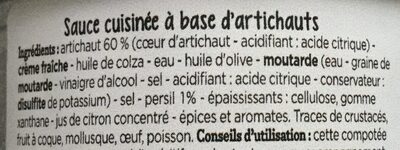Compotée d'Artichaut - Franprix - 100 g
This product page is not complete. You can help to complete it by editing it and adding more data from the photos we have, or by taking more photos using the app for Android or iPhone/iPad. Thank you!
×
Barcode: 3263853005913 (EAN / EAN-13)
Common name: Sauce cuisinée à base d'artichaut
Quantity: 100 g
Brands: Franprix
Categories: Spreads, fr:Condiments à tartiner, fr:Compotée d'artichaut
Labels, certifications, awards:
Green Dot
Manufacturing or processing places: France, Loire-Atlantique
Traceability code: FR 44.080.001 CE - Lavau-sur-Loire (Loire-Atlantique, France)
Stores: Franprix
Countries where sold: France
Matching with your preferences
Environment
Packaging
Transportation
Report a problem
Data sources
Product added on by openfoodfacts-contributors
Last edit of product page on by packbot.
Product page also edited by autorotate-bot, beniben, kiliweb, teolemon, yuka.UUtzdkY2Z2poNkl2bGN3QW9oblZ4TXQweWNUNVlucUlCZTgzSVE9PQ.











